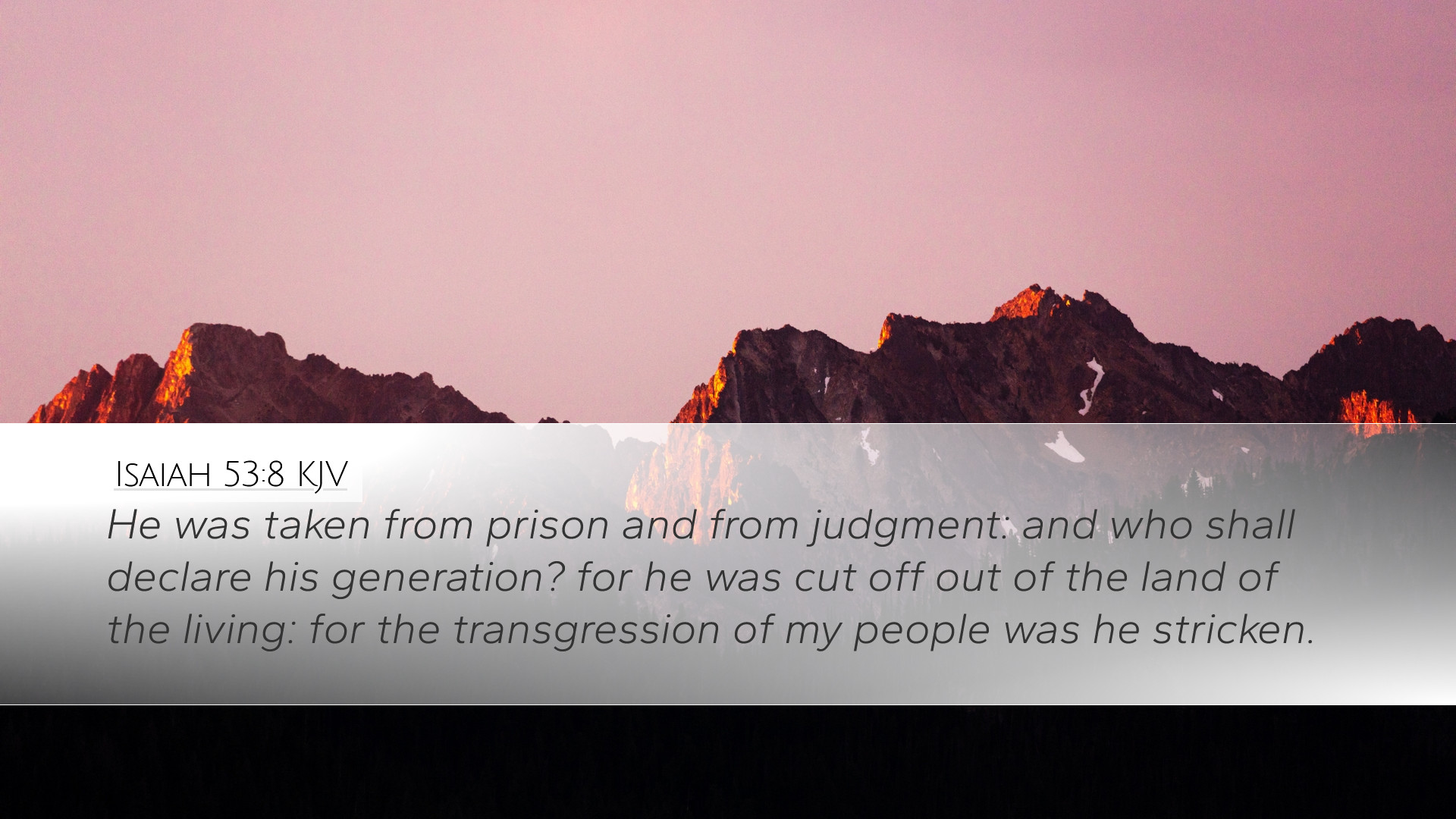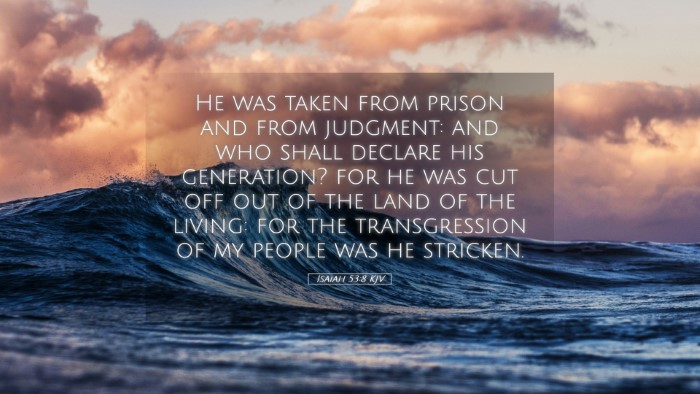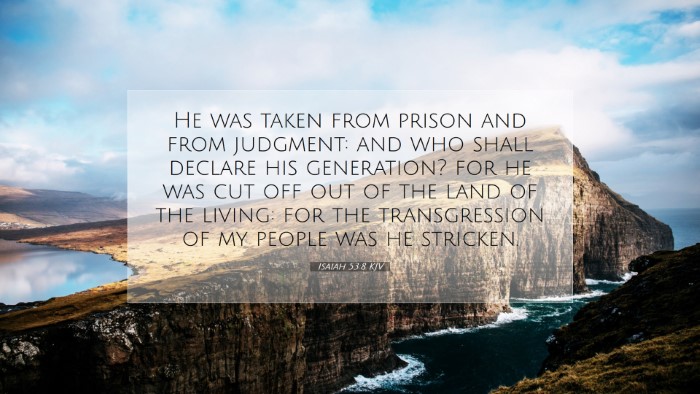Commentary on Isaiah 53:8
Verse: "He was taken from prison and from judgment: and who shall declare his generation? for he was cut off out of the land of the living: for the transgression of my people was he stricken."
Introduction
The verse Isaiah 53:8 sits within the profound context of the Suffering Servant, a central theme of Isaiah's prophetic writing. This particular verse encapsulates the injustice faced by the Servant and serves as a pivotal point for understanding the redemptive purpose of Christ's suffering. This commentary will draw insights from Hebrew Scripture, historical context, and theological interpretation as informed by notable public domain biblical scholars.
Interpretation of the Text
In examining the verse, we find a deep well of meaning that resonates through the ages, particularly as it foreshadows the passion of Christ. The verse begins with a reference to 'prison' and 'judgment', which, as Matthew Henry notes, signifies the unjust treatment of the Servant.
Henry writes, "He was taken from prison and from judgment," indicating the illegalities of the trial before the crucifixion, a clear parallel to the experiences of Jesus, who was wrongfully accused and condemned. Henry emphasizes the shame and isolation faced by the Servant during this period.
Theological Implications
The phrase "who shall declare his generation?" raises poignant questions regarding legacy and lineage. Albert Barnes remarks that this rhetorical question suggests a lack of understanding or acknowledgment of the Servant's true significance. He highlights that many observed Jesus’s external appearance and circumstances without grasping His divine mission. This signifies the broader human condition—often blind to the redemptive work of God.
Christological Significance
From a Christological perspective, this verse is foundational in understanding the nature of Christ's sacrifice. Adam Clarke elaborates on the phrase "he was cut off out of the land of the living," suggesting that the Servant's death was a sacrificial act, designated for the sake of the transgressions of God's people. Clarke underlines that this demarcation of being "cut off" reflects the severity of judgment due to sin.
Redemption and Atonement
At the heart of this passage lies the doctrine of atonement. The latter part of the verse states, "for the transgression of my people was he stricken," which reveals the profound sacrificial aspect of the Servant's suffering. As Barnes elucidates, the Servant bears the iniquities of the people, offering a powerful expression of substitutionary atonement. His suffering was not for His own failings, but as a response to humanity's sinfulness, illustrating the depth of divine love and grace.
Historical Context
Understanding the historical context is crucial. Isaiah's prophecy was delivered during a time of great turmoil for Israel, marked by impending judgment and exile. The depths of despair during this period find their reflections in the prophetic hope offered through the Servant imagery. Henry notes that this profound suffering paved the way for eventual restoration. This duality of suffering and hope speaks powerfully to the church today, reminding believers of the redemptive arc throughout scripture.
Moral and Ethical Reflections
This verse also invites moral and ethical reflections that can be of great importance to pastors and theological scholars. The unjust suffering of the Servant challenges believers to speak against injustice in their contexts. Clarke points out that recognizing the Servant's mistreatment compels those who follow Christ to advocate for the marginalized and oppressed, imitating Christ’s compassion and grace in practical ways.
Practical Applications
For Pastors
Pastors can draw from this passage a rich source of encouragement to their congregations. The understanding of Christ's suffering serves as a reminder that God is intimately aware of human pain and injustice. The implication for pastoral care is profound; Christ’s journey through suffering provides a model for empathizing with those who endure trials. Matthew Henry reflects upon this, recognizing that in suffering, believers find their savior walking alongside them.
For Students and Theologians
Students and theologians can explore the theological depths of this verse, engaging in discourse on themes of atonement, legalistic judgment, and divine grace. The interplay between prophecy and fulfillment can lead to critical dialogues on the nature of God's redemptive plan through Christ. Barnes emphasizes that this verse points to the ultimate resolution of all human sin and suffering through the Servant's sacrifice, making it vital for theological reflection.
Conclusion
Isaiah 53:8 is not merely a historical account nor only a prophetic declaration; it serves as a lifeline of hope and a paradigm of suffering embraced for the sake of salvation. It speaks profoundly to the heart of Christian faith, revealing the lengths God goes to redeem His people. As believers meditate on this verse, they are invited into a deeper understanding of the nature of Christ's suffering and its implications for their own journeys of faith.
Final Thoughts
In closing, the insights offered by Henry, Barnes, and Clarke enrich the reading of Isaiah 53:8, allowing contemporary readers—pastors, students, and theologians—to grasp the enduring truth found within this crucial verse. The Suffering Servant's narrative proclaims a message of hope, redemption, and belonging to all who seek to understand the complexities of God’s plan through scripture.


